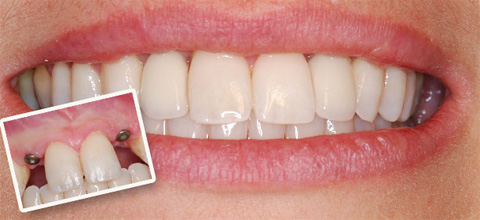Dental Implants
A dental implant is used to support one or more false teeth. It is a titanium screw that can replace the root of a tooth when it fails. Just like a tooth root, it is placed into the jawbone. Putting an implant in is often easier than having a tooth out and is usually done using a simple local anaesthetic. You will not feel any pain at the time but, just like after an extraction, you may feel some discomfort during the week after the surgery.

Implants are a safe, well-established treatment and can, much like natural teeth, last for as long as you care for them. However, just as with other surgical implants (such as a hip replacement) there is no lifetime guarantee.
A dental implant is used to support one or more false teeth. It is a titanium screw that can replace the root of a tooth when it fails. Just like a tooth root, it is placed into the jawbone.
Are dental implants painful to put in?
No – placing an implant is often easier when put in than having a tooth out and is usually done using a simple local anaesthetic. You will not feel any pain at the time but, just like after an extraction, you may feel some discomfort during the week after the surgery.
If you are particularly anxious, or if your case is a complicated one, we might provide a sedative for you. General anaesthetics are rarely used for implants and are generally only used for very complex cases.
Edvina is experienced is an elected member of the Society for the Advancement of Anaesthesia in Dentistry and is very adept in using oral and IV sedation, local and topical anaesthesia that, combined with her ‘gentle touch’, will make all the difference to your care
Will they suit me?
Whether implants are appropriate will depend on the condition of the bone in your jaw. We will conduct a number of special tests to find out about the amount of bone still there. If there is not enough, or if it isn’t healthy enough, it may not be possible to place implants without grafting bone into the area first.

Are they safe and how long will they last?
Implants are a safe, well-established treatment. Your implants will probably, much like your natural teeth, last for as long as you care for them.
How well you look after your implants – and whether you make your regular maintenance appointments – will have the biggest impact on how long they will last.
If you don’t look after your implants they will develop a coating similar to what you get on neglected natural teeth. Left untreated, this can lead to gum infection, bleeding, soreness and general discomfort. You could, of course, get all these problems with natural teeth.
If your implants are well looked after, and if the bone they are fitted to is strong and healthy, you can expect them to last for many years. However, just as with other surgical implants (such as a hip replacement) there is no lifetime guarantee.
What if the implant does not fuse with the bone?
This happens very rarely. If the implant becomes loose during the healing period, or just after, it is easily removed and your jaw will heal in the normal way. Once your jaw has healed, another implant can be placed there. Or we can make a bridge, fitting it to your natural or other the implanted false teeth that have been successful.
How long will treatment take?
After your implants have been placed, the bone in your jaw needs to grow onto them and fuse to them. This usually takes a few months. Sometimes the implants may be stable enough when they are placed for the false teeth to be fitted sooner than this.
If you are having one, two or three teeth replaced, we may fit a temporary denture in the meantime. If you already have full dentures, you can keep wearing these while your implants are healing. Your dentures will need altering, to fit properly after the surgery, and a ‘healing cap’ will usually be placed onto the implant site to protect it.
Are implants hard to clean?
No more than natural teeth. But aftercare is important if you are going to have a long-lasting, successful implant. We will give you detailed advice on how to look after your implants. Cleaning around the teeth attached to the implants is just like cleaning natural teeth. However, there may be areas that are difficult to reach and we’ll show you how to clean them. You may need to visit our hygienist more often but we will be able to guide you about this.
Are there other advantages?
Yes. If you have an implant to replace a single tooth, there is no need to cut down the teeth either side of it. If you had a bridge, we would need to do this and fit crowns to these teeth to support the bridge.
Normal dentures can mean that eating and drinking are affected because the dentures may move about. But teeth attached to an implant don’t cause this problem because they are anchored to the bone more firmly than natural teeth.
How much will it cost?
We will always let you know specifically what your personal treatment plan will be. In many situations, the cost of the treatment is only a little more than the cost of more conventional dental treatment with crowns and bridges. Over the longer term, implants are usually a more cost-effective and satisfactory option.
So, if you are new to the area, have a particular concern, or are in any way anxious – you are very welcome to come on in and talk to us.
Call 01295 709 500 – we are here to help you.


